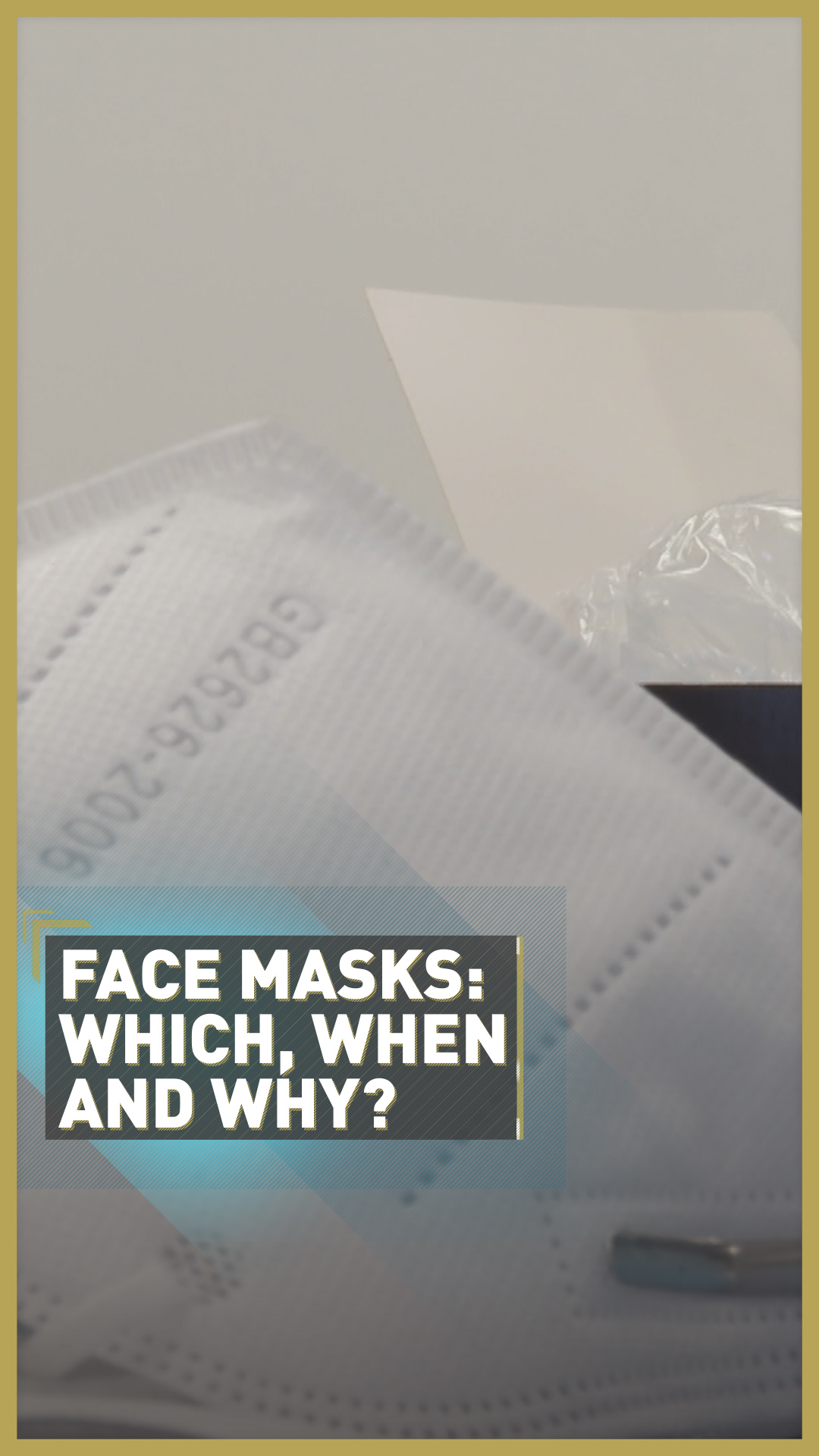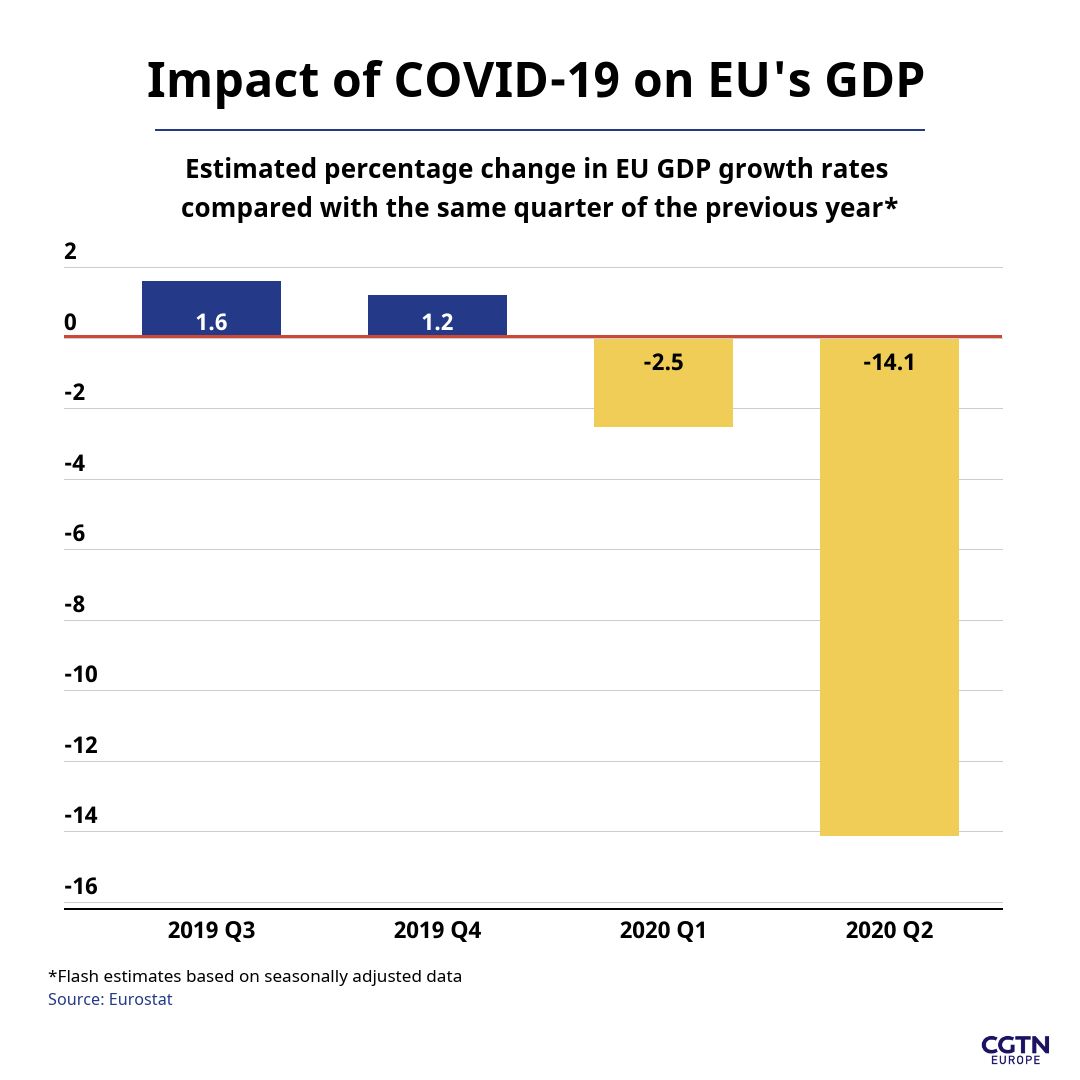"I expect growth to turn positive in the July-September quarter. But globally, the rebound is sluggish everywhere except for China."
Hopeful words from Takeshi Minami, chief economist at Japan's Norinchukin Research Institute, following dire news of the country's record economic plunge today.
Japan is the latest country, following the UK, Germany and others, to announce a huge blow to its economy and a steep GDP decline because of the seemingly unending effects of the COVID-19 pandemic.
Elsewhere in Asia, Thailand has also announced its sharpest economic downturn in a second quarter since the 1990s.
Sadly, we're sticking with bleak GDP news for our graphic today, which is showing a significant estimated decrease in the European Union's GDP figure for the second quarter of 2020 compared with the same period last year. Scroll down to take a look at just how sharp the decline is.
In other news, the UK, which last week announced it was officially in recession, has received further discouraging signs for its economic recovery after newly-released survey figures show that household finances have deteriorated this month as Britons worry about their jobs.
Germany, however, looks like it is faring a little better, as the Deutsche Bundesbank said the economy was making a swift comeback after its worrying figures in the second quarter.
It seems that several countries are remaining hopeful for the third quarter, but it remains to be seen whether this confidence is well-placed. Here's hoping.
Enjoy reading,
Arij Limam , Digital correspondent
**P.S. Did you know we send this briefing by email, too? **
Sign up here

Japan was hit by its biggest economic slump on record in the second quarter of this year. The world's third-largest economy shrank an annualized 27.8 percent in April-June , government data has shown, marking the biggest decline since 1980, as COVID-19 battered consumption and trade. The third straight quarter of declines knocked the size of real gross domestic product (GDP) to its lowest since April-June 2011 .
The U.S. has announced it will further increase restrictions set out in May on Chinese telecommunications giant Huawei , aimed at cracking down on its access to commercially available chips. The Trump administration will also add 38 Huawei affiliates in 21 countries to the U.S. government's economic blacklist , sources tell Reuters, raising the total to 152 affiliates since Huawei was first added in May 2019.
The financial health of households in the UK worsened in August at a faster pace than last month, according to the Household Finance Index from data company IHS Markit. This is seen as a discouraging sign for Britain's economic recovery from the pandemic, which could be made worse in the context of the recession facing the country.
Germany's economy is set for a rapid and **broad-based recovery **after an unprecedented peacetime contraction in the spring, but a coronavirus vaccine may be necessary before a complete rebound is possible, the Bundesbank has said. After shrinking by a tenth in Q2, Europe's biggest economy has been making a comeback since much of the epidemic was contained and many restrictions on businesses and daily life were lifted.
French pharmaceutical company Sanofi has agreed a $3.7 billion deal to buy U.S.–based rival Principia Biopharma , the companies announced. The purchase is the latest in a line of the company's acquisitions in the biotech sector.
China has slammed Washington for using "digital gunboat diplomacy" after U.S. president Donald Trump ordered TikTok's Chinese owner ByteDance to sell its interest in the Musical.ly app it bought and merged with TikTok. The order issued late Friday builds on sweeping restrictions issued last week by Trump that TikTok and WeChat end all operations in the U.S.
Thailand's economy contracted at a 12.2 percent annual rate in the April-June quarter, its sharpest downturn since the Asian financial crisis of the late 1990s.
U.S.-based internet giant Google has written an "open letter to Australians," warning that their government's proposed antitrust laws – designed to make digital giants including Google and Facebook pay for siphoned news content – threatens users' free search services in the country and could hand users' data to media organizations.
American tech company****IBM has announced a new processor chip for data centers that it says will be able to handle three times the workload of its predecessor . The Power10 chip will be manufactured by South Korean conglomerate Samsung , and is designed to be faster at artificial intelligence computing tasks.
Europe's biggest budget airline, Ryanair, is to reduce its flight capacity by 20 percent during September and October after reimposed coronavirus restrictions resulted in a notable weakness in forward bookings over the last 10 days. The Irish airline has said the cuts will be heavily focused on France, Ireland, Spain and Sweden and mostly involve frequency reductions rather than route closures .
British home sales hit a record high between mid-July and early August according to property website Rightmove, with transactions more than 20 percent higher than the previous record . Industry data showed the usual summer slowdown was avoided thanks to pent-up demand from the coronavirus lockdown and a desire to leave the capital London.
Watch: With France mulling over imposing the wearing of face masks in****shared workspaces and Italy making masks compulsory in public spaces, countries across Europe seem to be changing their tune on face masks as they grapple with a rebound of cases.
But why the European reluctance early on?
CGTN Europe put this question to Simon Kolstoe, senior lecturer at the School of Health and Care Professions at the UK's University of Portsmouth, who also walked us through which face masks to where and when.
04:18

The UK government has led the way globally in helping the performing arts industry to recover from the COVID-19 shutdown. It's pulled together a rescue package worth almost $2 billion.
**CGTN Europe's **
The Agenda with Stephen Cole
** spoke to Giles Watling – UK member of parliament and chair of the newly-formed all-party parliamentary group for theater – about the struggling industry.**
One-and-a-half billion dollars on the arts. It's gone down very well, but is it enough to rescue British theater from the pandemic?
No, frankly, it's not. But I'm not talking just about money here. What we need now is a sense of timing so the theater can get back to work.
What really concerns me are the provincial and regional theaters, which typically have to survive on a very high percentage audience turnover. As I said in parliament, Rome is burning. Theaters closing all over the country. People are being laid off.
It's a lot of money to go to the performing arts. Why does the government think the performing arts is so important?
We've exported Britain's values to the world through British theater.
We are respected, since the time of Shakespeare. It is one of our major selling points. And on the back of that, you can sell Tetley Tea to Brazil. It's what we are. It defines us. It's much more than just people standing onstage and entertaining. It's community, it's mental health.
Lastly, has the nature of live entertainment changed for the foreseeable future do you think? I'm stopping myself from saying forever.
Well, I sincerely hope, Stephen, that it's not forever and I don't think it will be. The willingness is there and once we have a vaccine and we begin to get more effective treatments, then it's entirely possible we'll be back and this will just be a bad memory. But I reckon it will be a year, maybe more.
COVID-19's economic impact on Europe is becoming much clearer. In the second quarter of 2020, still marked by coronavirus containment measures in most EU member states, flash estimates released by Eurostat show that GDP dropped by 14.1 percent compared with last year.
At a national level, Spain experienced the largest relative decrease at 22.1 percent, followed by the UK at a 21.7 percent decrease.

 简体中文
简体中文

